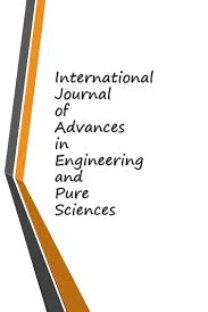Benzalkonyum Klorür Katkılı PVA/Gelatin Nanolif Yapılarının Antibakteriyel Özellikleri
Poli (vinil alkol) (PVA), iyi kimyasal dayanımı, iyi termal kararlılığı, iyi fiziksel özellikleri, mükemmel biyouyumluluğu ve ucuzluğu nedeniyle çok dikkat çeken hidrofilik, yarı kristalli bir polimerdir. Jelatin (G) biyomedikal uygulamalar için ilginç ve doğal bir polimerdir. Elektroeğirme, yüksek yüzey alanına sahip çok gözenekli nano elyaf üretimi sağlayan basit bir yöntemdir. Elektrospinning yöntemi kullanılarak biyomedikal, filtrasyon, enerji depolama ve koruyucu malzemeler üretmek mümkündür. Benzalkonyum klorür (BAC), ticari yara sargısında yaygın olarak kullanılan ve Gram-pozitif bakterilere karşı güçlü bir role sahip olan bir tür antimikrobiyal katyonik yüzey aktif malzemedir. Bu çalışmada, çeşitli konsantrasyonlarda BAC, PVA ve G içeren çözeltilerin nano lifler üretilmiştir. Elde edilen nano lif yapısının lifleri homojen, sürekli ve yoğundur. İyi mekanik ve antibakteriyel özellikler açısından optimum parametreler belirlenmiştir. 11.63% PVA + 1.0% G +1.0% BAC içeren S2 örneği en iyi morfolojik ve mekanik özellikler göstermesinin yanında en ince elyaf çapına (51 ± 13nm) ve en yüksek dikey dayanıma (4.299MPa) ve yatay dayanıma (4.058MPa) sahiptir. Ayrıca test edilen tüm bakterilere (E. coli, P. aeruginosa, B. subtilis ve S. aureus) karşı antibakteriyel aktiviteye sahiptir. İyi mekanik ve antibakteriyel özelliklere sahip olması nedeniyle, S2 örneğinin tıbbi sektörde birçok kullanımı olabileceği sonucuna ulaşılmıştır.
Anahtar Kelimeler:
Elektroeğirme, PolivinilAlkol, PVA, Benzalkonyum Klorür, BAC, Antibakteriyel, Nanolif
ANTIBACTERIAL CHARACTERISTICS OF NANOFIBER STRUCTURES OBTAINED BY BENZALKONIUM CHLORIDE ADDITIVE POLY (VINYL ALCOHOL)/GELATIN
Polyvinyl alcohol (PVA) is a hydrophilous and semi-crystallized. It has attracted much relevancy due to its pretty chemical endurance, fine thermal determination, decent physical specialities, wonderful bio-compatibility and cheapness. Gelatin (G) is a natural polymer and that are interesting materials for biomedical applications. Electrospinning is a simple method that provides very porous nanofiber production with high surface area. It is possible to produce biomedical, filtration, energy storage and protective materials by using electrospinning method. Benzalkonium chloride (BAC) is a kind of anti-microbial cationic surface-active agent, which has been pretty used in merchant wound dressings and has a powerful status toward Gr+ bacteria. In this study, nanofibers were produced from electrospinning of BAC, PVA and G containing solutions at various concentrations. The fibers of obtained nanofiber structure were uniform, continuous and intensive. The optimum parameters in terms of good mechanical and antibacterial properties were determined. S2 sample, electrospun from 11.63% PVA + 1.0% G +1.0% BAC containing solution, had the best morphological and mechanical properties due to having the thinnest fiber diameter (51±13nm) and the highest vertical strength (4.299MPa) and horizontal strength (4.058MPa). It also had antibacterial activity against all the bacteria tested (E. coli, P. aeruginosa, B. subtilis and S. aureus). Due to owning good mechanical and antibacterial properties, S2 sample can have many uses in medical sector.
Keywords:
Electrospinning, poly(vinyl alcohol), gelatin, benzalkonium chloride, antibacterial, nanofiber,
___
- Liu, Haifeng, Ding, Xili, Zhou, Gang, Li, Ping, Wei, Xing, Fan, Yubo, 2013, Electrospinning of nano fibers tissue engineering applications, Hindawi Publishing Corporation Journal of Nanomaterials
- Karakaş, H., 2015, Electrospinning of nanofibers and their applications, 7. Framework Programme
- Bhardwaj, Nandana, Kundu, Subhas. C., Electrospinning: A fascinating fiber fabrication technique, Biotecnology Advances 28, 2010
- Supaphol, Pitt, Chuangchote, Surawut, On the electrospinning of polyvinyl alcohol nanofiber mats: A revisit, Vol.108, 2008, Journal of Applied Polymer Science
- Siridamrong, P., Swasdison, S., Thamrongananskul, N., 2015, Preparation and characterization of polymer blends from Nang noi Srisaket 1 silk fibroin, gelatin, and chitosan nanofiber mats using formic acid solution, Vol.659, Key Engineering Materials
- Topuz, Fuat, Uyar, Tamer, 2017, Electrospinning of gelatin with tunable fiber morphology from round to flat/ribbon, Materials Science and Engineering, C 80
- Elder R.L., 1989, “Final report on the safety assessment of benzalkonium chloride” Journal of the American College of Toxicology, 8 (4), pp. 589-625
- Khan, Adnan Hossain, Libby, Mark, Winnick, Daniel, Palmer, John, Sumarah, Mark, Ray, Madhumita B., Macfie, S. M., Uptake and phytotoxic effect of benzalkonium chlorides in Lepidium sativum and Lactuca sativa, Journal of Environmental Management, 206, 2018
- You, Young, Lee, Seung Jin, Min, Buyong-Mu, Park, Won Ho, Effect of solution properties on nanofibrous structure of electrospun poly (lactic-co-glycolic acid), 99 1214–1221, 2006, Journal of Applied Polymer Science
- Tong, Ho Wang, Wang, Min, Electrospinning of poly(hydroxybutyrate-co-hyroxyvalerate) fibrous scaffolds for tissue engineering application: effects of electrospinning parameters and solution properties, B 50 1535–1558, 2011, Journal of Macromolecular Science
- Kim, Sung Jin, Nam, Young Sik, Rhee, Do Mook, Park, Hyun-Sul, Park, Won Ho, 2007, Preparation and characterization of antimicrobial polycarbonate nanofibrous membrane, European Polymer Journal, 43 3146–3152
- Arumugam, Ganesh Kumar, Khan, Sourabh, Heiden, Patricia A., Comparison of the effects of an ionic liquid and other salts on the properties of electrospun fibers, 2-poly(vinyl alcohol). Macromol. Mater. Eng. 294 45–53, 2009
- Yayın Aralığı: Yılda 4 Sayı
- Başlangıç: 2008
- Yayıncı: Marmara Üniversitesi
Sayıdaki Diğer Makaleler
Hande SEZGİN, İpek YALÇIN ENİŞ, Merve KÜÇÜKALİ ÖZTÜRK, Telem GÖK SADIKOĞLU
Investigation Barrier Properties of Linear Low Density Polyethylene (LLDPE) Spunbond Fabrics
Benzalkonyum Klorür Katkılı PVA/Gelatin Nanolif Yapılarının Antibakteriyel Özellikleri
Metin YÜKSEK, Onur YOLAY, Erdem TEZCAN, Erkan İŞGÖREN, Derya SALTIK, Fatmagül ÇALIŞKAN
PBT/Naylon Karışımlı Dikişsiz Kumaşların Tek Banyoda Boyanması
Fatma Filiz YILDIRIM, Esra GELGEÇ, Şaban YUMRU, Mustafa ÇÖREKCİOĞLU
BAMBU SÜPREM ÖRME KUMAŞLARIN TERMAL TRANSFER BASKI SİSTEMİNDEKİ BASILABİLİRLİĞİ
Sinan Sönmez, Muhammed UZUN, Ahmet Akgül
Mehmet KILINÇ, Kübra YILDIZ, Aşkın TEKİN, Nur KILINÇ, Muhammet UZUN
